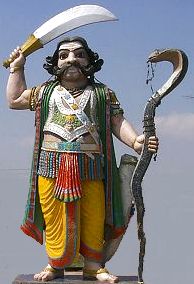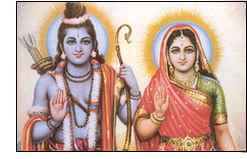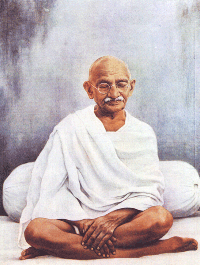
TO BE DEV OR DANAV - THE CHOICE
Author - Anil Chawla

|
TO BE DEV OR DANAV - THE CHOICE
|
Every language has words that cannot be translated. Adam Jacot de Boinod says in his book "The Meaning Of Tingo", to understand the culture of a people, one has to only understand the words in the people's language that cannot be translated. "Dev" and "Danav" are two such words of Sanskrit. Synonyms in Sanskrit are Sur and Asur; or Devta and Daity. The two words are wrongly translated into English as Gods and Demons. The translations distort not just the meaning of the words but also the cultural context and philosophical paradigm in which the words are used.
Dev or Devta is someone who gives without any direct expectations in return. A dev becomes divine by his selflessness. Sun, moon, fire and water are represented by their respective devs. But the phenomenon of being a dev is not restricted to just these natural bodies or forces. Every human being, as and when he or she, indulges in giving selflessly, acquires the property of being a dev (or devi, for women). A mother is a devi because she gives love and care to her child. A wife may be a devi for her husband and a husband may be a dev for his wife.
On the other hand, it is possible for a husband-wife relationship to be a danav-danavi relationship. In contrast to the daivik (derived from dev) relationship, a danav is self-centered and tries to maximize what he can grab. A dev gives out of love, compassion and because giving is a pleasure. A danav does not derive any pleasure from giving. For him the pleasure is from acquiring or possessing. He gives only when he is forced to.

Popular notion of danav, even in India, tends to be that a danav or rakshas was a special creature with large teeth, enormous body, and may be, horns on the heads. Nothing can be farther from truth. Danavs are not some pre-historical mythological creatures, who have ceased to exist. Danavs and devs, both continue to live. No community or caste has a monopoly on dev or danav. Ravan was son of a Brahmin, but he chose to be a danav. Kans and Krishn were relatives. Kans chose to be a rakshas, while Krishn is worshipped as a dev.
Every human being has a potential to be a dev as well as to be a danav. The fact is that most of us become dev at some times and danav at some other times. Conflict between being dev or danav is a perpetual war that goes on in the mind and heart of each one of us. To be a dev or to be a danav - that is a choice, which one faces at every step of one's life.
To understand the complexity of dev-danav choice, it is necessary to understand a paradox connected with the two lifestyles. A dev tends to always give away and a danav tends to grab or acquire by hook or by crook. So, it would appear that the dev would become weaker and weaker, while the danav would gain strength at each step. Apparently and in the short term, it does happen to be so. But, in the long-term, exactly the opposite happens. Dev receives unexpected cosmic help and danav's apparent strength is of no use. This is paradoxical, but true. The paradox is explained by recourse to a divine force that tends to favour the dev as against danav. Different religions give different names to this divine force. Whether, we accept the existence of such a divine force or deny any such divine force, the fact remains that devs win in the long run, even though they appear to be weak initially. This is the moral of Ramayan as well of Mahabharat, the two great epics of Hinduism.

Ram's war with Ravan was not a fight for a woman. At stake were two opposing models of society. Ravan had built a city (Lanka) of gold. This could not have been possible without a massive flow of resources from a large territory. In a way, Ravan was the first colonialist, who had converted most of India into his colony. Flow of resources should have strengthened Ravan and it did so for a while. Ram, on the other hand, was a daivik king, who provides efficient administration and protection, but takes from his subjects only as much as is prescribed by rules made by thinkers and scholars. During the war with Ravan, Ram was not even a king. He was a barefooted leader of the downtrodden masses.
The victory of Ram over Ravan was as strange and shocking, as the killing of Kans, an oppressing despot, by a teenaged boy named Krishn was. Mahabharat has innumerable such instances. The final fight, between the rulers of all-powerful Hastinapur on one side with five poor brothers on the other side, is also a dev-danav fight. To someone who compares military strengths and draws conclusions, the victory of five poor brothers appears inexplicable, but to someone who believes in the ultimate victory of dev over danav, it is not unexpected.
Some so-called rationalists may not accept Ramayan and Mahabharat citing lack of historical evidence. But, when we look at history, the same message comes across loud and clear. In the Indian sub-continent, there have been many kings who looted their subjects without any restraints imposed by any traditional laws or considerations of morality. These kings built monuments that are even today tourist attractions. Shahjehan built majestic Taj Mahal (Some claim that he just converted an old Hindu temple into a mausoleum. But let us ignore this for a while.) It cannot be a mere coincidence that the reign of Shahjehan marks the beginning of the end of Mughal Empire. Jewels of Nizam of Hyderabad are supposed to be the world's most expensive treasure. Sure enough, while Nizams became rich, their people became poor. Of course, the Nizams too did not last long.

The Nizams or Moghuls had no interest in the people that they ruled over. Maximization of revenue and personal aggrandizement were their only objectives. They were building mausoleums and collecting jewels while their own people were dying of hunger. They did not feel the need to justify the reasonableness of the tax revenue they were collecting. Grabbing all that they could lay their hands on was their only creed. Lands, crops, agricultural produce, gold, wealth, and even women - they believed that, as victors, they could take anything and everything with impunity. All for a few - that could be summed up as the motto of these regimes.
Nizams and Moghuls were followed by the British, who were not much different. British rulers were at times more mean and cruel than their predecessors. Land revenue rates during British regimes rose to such high levels that Indian agriculture collapsed. During the two centuries or so of British rule, in every decade more people died of starvation in India, than in any decade before them or after them. Probably, the only saving grace was that the British did not believe in picking up beautiful women from Indian villages as a matter of right. There can be no doubt that, viewed collectively, the British as well as their predecessor Muslim rulers of India were danavs. They believed in acquiring, in possessing and not in giving.

Gandhi played an important role in India's freedom movement. One may have one's ideological differences with him. Yet, one cannot deny his simple lifestyle. He cannot be accused of building a dynastic empire or living a life of luxury. Gandhi was a dev, who gave all that he could to his society and country. But, the same cannot be said of his followers. Gandhi's dream was to bring Ram Rajya (kingdom of Ram) to India. Unfortunately, Gandhi failed to articulate his vision of Ram Rajya in more concrete terms. Gandhi's followers abandoned his dream and instead favoured continuation of the legacy of British Empire. They have built more monuments than even the British and Moghuls could. Transfer of resources from the vast hinterland to urban centres increased in the post-independence era. Cities flourished, while rural masses were forced to migrate to cities.
In independent India, the model of development has been based on massive transfer of resources to urban centres and to ever-expanding government machinery. Though, today, there is no one demon-king like Ravan or Kans, but the modern-day politicians and bureaucrats of India behave no different. They believe that a victor takes all. No institutions, no traditions, no norms, no values are too sacred for these danavs. There can be no doubt that these danavs will meet the same fate as that of Ravan, Kans and Duryodhan.
Before even starting to fight against these danavs, one must fight the danav within oneself. Danav rulers do great damage, but the danav mindset among the general people is more harmful. With widespread danav attitudes within a society, it is futile to imagine that a daivik leadership can emerge in the society. The seeds of daivik attitudes have to be sown in minds and hearts of every individual.
Belief in the paradox that one stands to gain in the long run by giving rather than by grabbing all that one can lay one's hands on, is an essential building block for a healthy and happy life of the society as well as of each individual. It affects one's relationships with every person. One cannot be having a danav-like attitude when it comes to money and be a dev in relationships with the opposite sex. Americans love to say "I take what I want" - a typical danav attitude. No wonder that USA is a country with one of the highest incidence of rape in the world and child abuse is more rampant in USA than in any Asian country.
For a danav, every thing or person is a tool for maximizing his / her pleasure. In a sexual relationship between a danav and danavi, both are working on their own pleasure/value-maximization equation - each trying to give away as little as possible, while simultaneously trying to grab as much as possible. In a society of danavs, children are viewed as nuisance to be endured, till they reach the legal age of maturity. Love is something to be laughed at or analyzed in pathological hairsplitting terms of Freudian or post-Freudian psychology.
For a dev, every person is an opportunity to give. Children, in particular, are so lovable and caring for them (even after they attain majority) is a pleasure that needs no justification. Sexual relationship is a manifestation of intense love. One is thrilled to please the partner, whose joy gives one the ultimate pleasure. The bed is just one aspect of the relationship, which continues till the end of life or even after that.
Dev or danav - it is not something that is decided by one's birth or caste or community or race or social class or riches or even education. It is a choice that each one of us exercises. One can choose to be a Ravan or be a Ram. Being a danav seems too often to be a pleasant, more fruitful, rewarding and profitable option. While being a dev involves sharing all that one has; it seems to be a path of thorns. It is at this point that one needs faith in the paradox of ultimate victory of dev over danav. May you always have this faith!
ANIL CHAWLA
Vijayadashmi
12 October 2005
Tailpiece:
Let me end this article with a prayer, which is supposed to be a peace mantra.
It is traditionally the last prayer for many Hindus on every solemn occasion.
I reproduce it here because it reflects the mindset of daivik culture.
SARVESHAM SARVASTI BHAVTU,
May all be for all;
SARVESHAM SHANTIR BHAVTU,
May all be at peace;
SARVESHAM POORNAM BHAVTU,
May all attain completeness;
SARVESHAM MANGALAM BHAVTU,
May all be 'mangal' (good)
LOKA SAMASTHA SUKHINA BHAVANTU.
May all people be 'sukhi' (a state of enjoyment)
Postscript
My friend, François Rochat, a committed evangelical Christian from Switzerland, has sent me
this beautiful prayer.
The Prayer of St. Francis of Asissi
Lord, make me an instrument of thy peace.
Where there is hatred, let me sow love.
Where there is injury, pardon.
Where there is doubt, faith.
Where there is despair, hope.
Where there is darkness, light.
Where there is sadness, joy.
O Divine Master, grant that I may not so much seek
to be consoled, as to console;
to be understood, as to understand;
to be loved, as to love.
For it is in giving that we receive.
It is in pardoning that we are pardoned.
It is in dying to self that we are born to eternal life.
Please write to me your comments about the above article.
 anil@samarthbharat.com
anil@samarthbharat.com
 hindustanstudies@yahoo.co.in
hindustanstudies@yahoo.co.in

ANIL CHAWLA is an engineer (and now a lawyer too) by qualification but a philosopher by vocation and a management consultant by profession.

Website developed and managed by

MF-104, Ajay Towers, E5/1 (Commercial),
Arera Colony,
Bhopal - 462016 INDIA


© All Rights Free